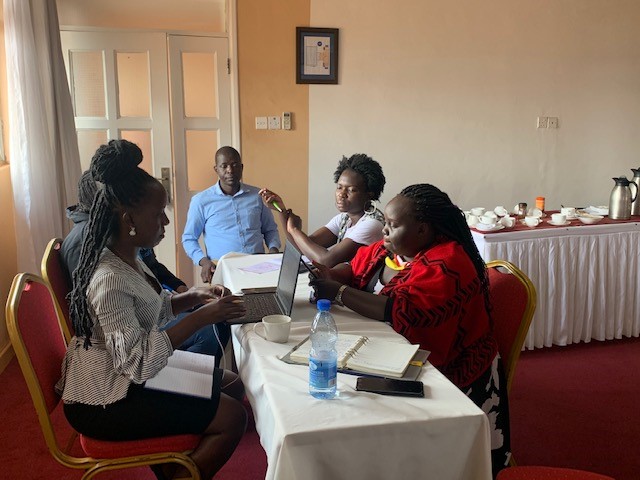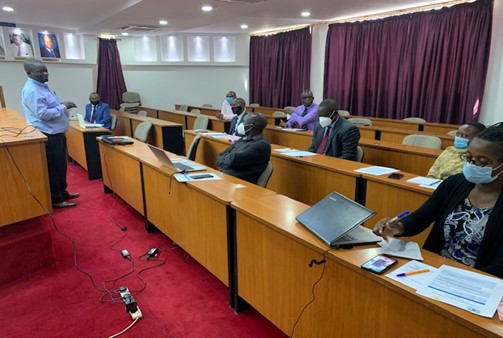Capacity building of East African trade unions
Capacity building of East African trade unions to advocate for trade deals that deliver decent work and support the UN Sustainable Development Goals
Project budget: Funding for phase 2 of the project is - £17,400
(The total 3-4 year project cost is £91,500)
The project aims to increase the capacity and efficacy of unions in the East African Community countries (EAC) – Burundi, Kenya, Rwanda, Tanzania and Uganda - to influence negotiations on trade deals involving the UK, EU and US so that they promote decent work, gender equality, access to social protection, and support meeting the United Nations Sustainable Development Goals (SDGs).
It is being run by the East African Trade Union Confederation (EATUC)
- More Information
-
Currently East African Community countries receive tariff free access to UK and EU markets due to their middle and lower income status. However, the Economic Partnership Agreements currently being pursued by UK and EU governments would require African countries to lower tariffs on UK and EU goods as a condition for retaining tariff-free access to UK and EU markets.
Unions in East Africa have raised concerns that this could lead to dumping of UK and EU goods on their markets which would put jobs at risk and mean that women workers particularly faced the threat of losing decent employment in the formal sector and being forced to work in the informal sector where exploitative conditions are common. Furthermore, individual trade agreements with East African Community countries threatens to undermine the customs union that exists between them.
The UK government negotiated its first Economic Partnership Agreement with an East African Community country in October 2020 when it signed the UK-Kenya Economic Partnership Agreement. The UK government is currently seeking to negotiate similar deals with the other East African Community countries.
The EU agreed an Economic Partnership Agreements with Kenya in February 2022 and is seeking to negotiate similar agreements with the other East African Community countries.
The US is also currently pursuing an agreement with Kenya that will require it to lower tariffs on US goods.
Meanwhile East African Community countries are also involved in negotiations over the African Continental Free Trade Agreement (AfCFTA) which aims to bring down barriers to trade between African countries and regional customs blocs. Trade unions have concerns that the AfCFTA may reduce social protections in the process of reducing ‘non-tariff’ barriers to trade and the agreement has no provisions to enforce fundamental labour rights.
In order to address trade union concerns about the ongoing Economic Partnership Agreements and the AfCFTA, it is crucial trade unions are involved in negotiations. To date there has been very limited engagement between the governments of East African Community countries and trade unions on trade negotiations.

-
Project Phase 1
-
Phase 1 project activities include:
Working with experts to develop a training manual. The baseline information provided by EATUC’s national affiliates between January and March 2020 will provide the basis for the development of the training materials and training content. EATUC and its affiliates are identifying a total of 70 trade union participants who will take part in training and train the trainer’ workshops. Participants will be identified through EATUC’s affiliates’ Women and Youth committees, to ensure inclusion. EATUC will work with its affiliates to develop an advocacy strategy.Project progress (August 2021)
Implementation of project activities has been impacted by the Covid-19 pandemic, but the project coordinator based at EATUC has made progress on delivering some project activities.
Outcomes in phase 1 include:
- Development of a training manual by the EATUC and the Southern and East Africa Trade Information and Negotiations Institution (SEATINI Uganda) – which covers the UN Sustainable Development Goals, especially Goal 8 (sustained, inclusive and sustainable economic growth, full and productive employment and decent work for all); information about the multilateral trading system; bilateral and regional trade and investment agreements and their linkage to decent work; and understanding the engagement structures related to trade at national, regional and global level to aid effective trade union advocacy.
- In November 2020, training of 10 trade union participants in Uganda, with a gender balanced group. This was delivered in collaboration with the National Organization of Trade Unions, Uganda, by SEATINI Uganda and the EATUC.
- A COTU-Kenya trade network was formulated as an outcome of the training, which will continue engaging government on trade union objectives in trade deals. This has supported the sharing of information, campaign plans & advocacy work in real time through social media on Whatsapp. EATUC also shares regional trade and investment news with all the trained members through this platform, and this has helped disseminate information to all the national affiliates and union experts.
- Increased partnerships with civil society organisations including GreenPeace Africa and ECOnews Africa to strengthen advocacy.
- In December 2020 and January 2021, COTU-(K) was able to successfully lobby some members of parliament to reject and delay ratification of the Kenya-UK FTA the first time it was tabled on the floor of Parliament in Kenya. The Unions in Kenya and their allies heavily opposed the deal pointing out that it wasn’t subjected to any public discussion and scrutiny that would generate and capture views of important stakeholders. The second time the deal came back to the floor of Parliament in Kenya, it was ratified (in February 2021). However, the government came out to address concerns raised by key stakeholders. It informed unions and other stakeholders that their views and concerns have been noted and would be considered once the deal is opened up for review in one year’s time.
- Relationships with like-minded organisations will be strengthened through joint campaigning, advocacy and media work.
- In November 2020, training of 12 trade union participants in Kenya, in a gender balanced group. This was delivered in collaboration with COTU-Kenya.
-
Project phase 2
-
Phase 2 project activities include:
- EATUC implementing the regional-level, two-year advocacy strategy, which was developed in phase 1, and supporting affiliates with developing and implementing their own national advocacy plans.
- Delivering ‘train the trainer’ sessions, in follow up to the training in phase 1.
- Developing trade policy position papers and making submissions.
- Continuing to strengthen relationships with like minded civil society organisations and undertake joint advocacy, campaigning and media work.
- Sharing information between the EATUC and TUC/affiliates on trade talks and trade policy is ongoing
Project progress (March 2022)
Despite the challenges of coronavirus, the project coordinator based at the EATUC, has made progress on implementing the project activities.
- Trade unionists in Kenya were able to use the advocacy strategy and learning from participation in the trade and investment training (Phase 1) to guide their involvement in high level political discussions aimed at including trade unions and trade union objectives in trade talks
- Advocacy developed to influence trade negotiations between East Africa Community countries and UK, US and EU as well as in the African Continental Free Trade Agreement (AfCFTA).
- Joint lobbying developed between trade unions in the East Africa and the UK against Economic Partnership Agreements
- The alliance building with other likeminded civil society organisations which work on trade and investment has continued to be strengthened at national level and sub-regional level.
- The Trade and Investment Networks developed in Phase 1, following training, have been very active in sharing information from all countries and at the regional level. Network members have shared information about their participation in meetings on trade and investment.
- The project coordinator has visited affiliates in Kenya and Tanzania to support their advocacy and campaign work in follow up to the training in phase 1.
- In Tanzania and Zanzibar, national trade union centres, TUCTA and ZATUC have been drafting their position papers on free trade agreements to inform key stakeholders, decision markers, and politicians on the role of trade unions in trade agreements, and why labour clauses should be included in trade and investment agreements.
- In October, national trade union centre, NOTU-Uganda, participated in a multi-stakeholder event organised by civil society organisations SEATINI Uganda and Third world Network under the theme “Assessing Uganda’s Investment Frameworks in View of the Proliferating Number of Human and Business Rights Violations” – aimed at ensuring human and environmental rights are upheld and prioritized in investment schemes. NOTU highlighted that most investors in Uganda do not respect the rights of local workers.
Project progress (June 2022)
- Project coordinator worked on delivering the two-year advocacy strategy, adapted to changing circumstances, with strategic links made between trade campaigns in EAC countries, and advocacy/campaigning by the TUC and affiliates.
- Ongoing national-level advocacy, campaigning and media work to influence trade talks/negotiations and/or debates in parliament, supported by EATUC.
- Training sessions for trade union officials, members and leadership delivered by ToT participants in Burundi, Kenya, Rwanda, Tanzania and Uganda, focussing on trade policy, advocacy and campaigning. Around 20 people will be trained in total and there will be a requirement that at least 30% of the workshop participants are women.
- Trade policy briefing papers (or submissions) in support of trade union positions at country and regional level. Campaigning materials developed and disseminated.
- Strengthened relationships with likeminded organisations and joint advocacy, campaigning and media work.
- Support for affiliates from EATUC to address challenges to implementing the learning from training and undertaking advocacy.

Stay Updated
Want to hear about our latest news and blogs?
Sign up now to get it straight to your inbox

